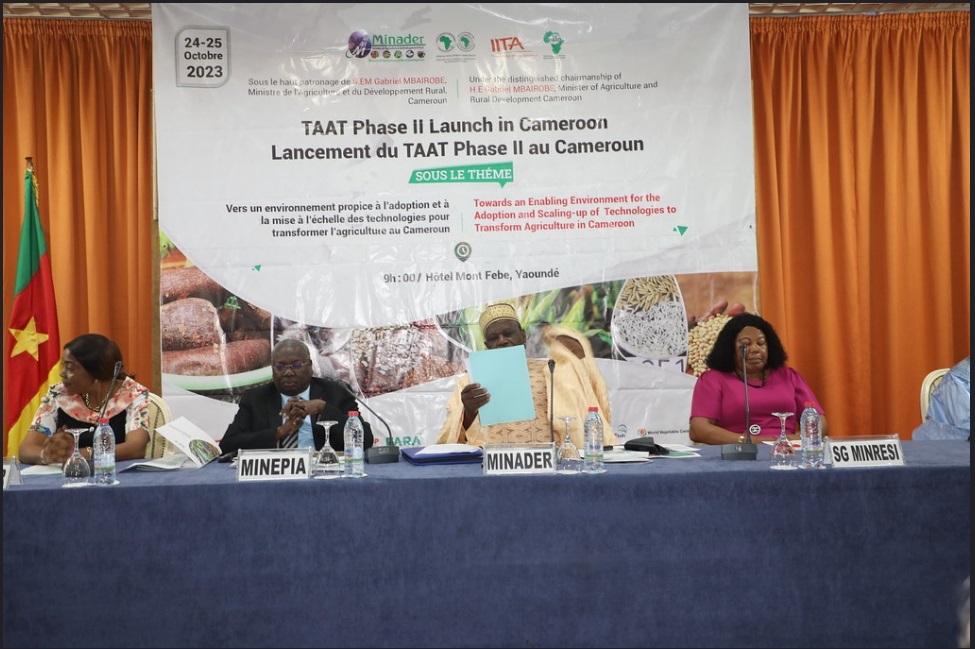
By Elias Ngalame
Bringing new technologies to smallholder farmers who are the end users is critical to driving agricultural production in Africa and Cameroon in particular, says the Technologies for African Agricultural Transformation (TAAT) programme.
Speaking at the launching of the second phase of the TAAT programe in Yaounde, Cameroon, October 24, 2023, Dr Christopher Suh, head of TAAT programme in Central African region says “there is urgent need to accelerate the transformation of African agriculture and efficiency along agrifood chains.”
He says though farmers are increasingly using innovative approaches combined with traditional knowledge, there is a need to take the shifts further to boost food production and nutrition quality and build climate resilience.
“In the second phase of the programme, we envisage accelerating the agriculture transformation process. We have all the experts to put their knowledge at the doorsteps of farmers and policymakers,” he said.
He cited technologies like hybrid rice, maize, cassava, and fish to add value and reduce post-harvest losses.
This was corroborated by Cameroon’s Minister of Agriculture, who sees the programme as a blessing not only in the Central African sub-region but the continent as a whole.
“The Technologies for African Agricultural Transformation is a major continental-wide initiative designed to boost agriculture productivity across the continent by rapidly delivering proven technologies to millions of farmers,” the Agric Minister, Gabrielle Mbairobe said at the opening of the launching.
Accordingly, TAAT is the brainchild of the African Development Bank (AfDB). The first phase was launched in 2018, focusing on the deployment of innovations, training and the dissemination of path-breaking initiatives and inputs for farmers and other stakeholders in the sector.
“These were achieved through government-supported projects financed by the AfDB and other donor agencies,” Dr Suh said.
It should be recalled that in July 2022, the AfDB announced it would disburse an additional $27.41 million (nearly CFA18 billion FCFA) for phase II implementation in beneficiary countries.
According to TAAT, the initiative generally is geared at increasing the productivity and income of farming households in 36 low-income African countries and giving them access to climate-resilient technologies. Specifically, the aim is to double the productivity of crops, livestock, and fisheries by making proven technologies available to more than 40 million agricultural producers by 2025.
“This will make it possible to produce an additional 120 million tons of food and lift 130 million people out of poverty,” according to AfDB.
In Cameroon, the program focuses on improving the production of maize, cassava, soybeans, rice, high-iron beans, and fish.
According to Dr Suh, through TAAT phase I, Cameroon was able to produce 3.5 million tons of pre-basic seed and 105.5 million tons of basic corn seed. In addition, some farmers have been trained in fry production, and over 100,000 fries have been produced locally.
“In the first phase, Cameroon missed out on certain areas because we were not sufficiently sensitised about the programme. That’s why we organised this awareness-raising workshop and launch of phase II in Cameroon, where all stakeholders are assembled to chart a pathway for the country’s agricultural transformation. This will drive agricultural development in Cameroon, which aligns with our President’s desire to see Cameroon adopt modern agriculture and create jobs and wealth for young people and women,” said Gabriel Mbairobe.
The workshop, which concluded on October 25, aimed to create a shared strategy for using available technologies to double the country’s agricultural productivity.
According to TAAT, Africa is home to 60% of the world’s arable land, yet we remain importers of food and unable to reap the benefits of our labour. Millions of our people are productive in the sector, yet we remain the most food insecure in the world. About 220 million Africans suffer from chronic undernourishment with about a fifth of the continent’s population and a quarter of the global total experiencing this burden.
TAAT believes it’s time to speed up efforts and change the narratives.
“Time is running out. Without extraordinary efforts by every African country, it will be difficult to meet these aspirations and targets. We need to work with the stakeholders to achieve the much desired Sustainable Development Goals (SDGs),” the Head of TAAT Clearinghouse, Dr Solomon Gizaw added.











